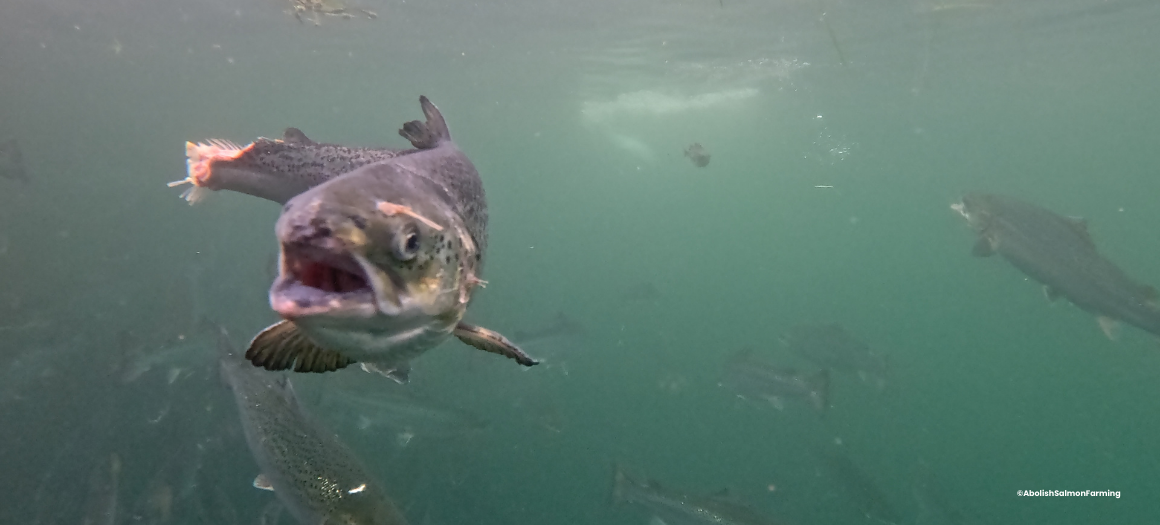Conservation and community groups blast Scottish Government for its “smoke and mirrors” proposals to protect iconic wild salmon from sea lice parasites

New proposed regulation will not initially apply to ANY of the 200+ salmon farms currently operating in Scotland – including 21 existing farms identified as “high risk” by the Scottish Environment Protection Agency (SEPA) which it refuses to name.
A group of Scottish conservation and community organisations have today published an open letter to the Scottish Government, criticising what they have called “smoke and mirrors” proposals to protect iconic wild salmon from sea lice parasites emanating from salmon farms.
The proposals being put forward by the Scottish Environment Protection Agency (SEPA), Managing interactions between sea lice from finfish farms and wild salmonids, are currently out for consultation.
In the letter, WildFish, Inside Scottish Salmon Feedlots (ISSF) and a number of community groups outline the limitations of the proposed regulation, including:
- It will initially not cover Scotland’s 200+ existing salmon farms.
- Initially not covering Orkney and Shetland, where one third of the salmon farming industry is located.
- Not including rivers where salmon populations have previously existed, thus breaching the Water Framework Directive.
- Salmon farming industry will provide its own refined modelling to demonstrate that planned new farms will not impact wild fish populations, leading to concerns of self-regulation and self-interest.
- Fundamentally, SEPA has said that it is not planning to rescind licenses or reduce permitted farm biomass if regulations are breached.
Any suggestion that this is the best we can do to protect one of Scotland’s most iconic species is laughable. At this point in time, SEPA’s proposed sea lice regulations will not apply to any salmon farms in Scotland; including 21 farms that SEPA has identified as presenting a high risk for wild salmon but has refused to name publicly.
Rachel Mulrenan
Scotland Director at WildFish
She continued: “how can any regulation applying to none of the industry it is supposed to be regulating, when the industry has been identified as already causing damage, be considered fit for purpose? This is not regulation to protect wild fish; this is regulation to give the illusion of protecting wild fish, while business (and expansion) continues as usual for the polluting salmon farming industry”.
The issue of sea lice parasites emanating from open-net salmon farms in Scotland, and the detrimental impact these sea lice have on wild salmon, has been a long-running issue in the Scottish salmon farming industry.
A type of marine parasite, high levels of sea lice on salmon farms are of concern to both farmed fish and wild fish populations; as few as two lice can fatally damage a young wild salmon. The Scottish Government last year declared that the wild Atlantic salmon population is in crisis, while catches for wild salmon and sea trout in Scotland in 2021 were the lowest on record.
In 2016, a petition to the Scottish Parliament by WildFish (then Salmon & Trout Conservation Scotland) let to two parliamentary inquiries into the negative environmental impacts of salmon farming. These inquiries both concluded that sea lice control to protect wild salmonids needed to be addressed as a priority, before expansion of the industry could continue.
In 2018 the Scottish Government established the Salmon Interactions Working Group; three years later, SEPA was tasked by Scottish Government with bringing forward proposals to address wild fish interactions in regulations. The current proposals set out a timeline up to 2027 and beyond; nine years since the petition.
Ms Mulrenan went on to say: “Despite the clear recommendations of not one, but two, cross-party Holyrood inquiries to address the impacts of existing salmon farms, five years of talking and stalling by the Government has delivered no meaningful protection for wild salmon or sea trout nor any prospect of it.
“The proposal anticipates some regulation of some farms, at some point in the future – but with no enforcement. Regulation which applies to none of the industry SEPA is supposed to be regulating, at a time where wild salmon are in crisis and sea lice from salmon farms are a risk to wild salmon, is not regulation at all. It’s greenwashing.”
Corin Smith, Founder of ISSF, said: “These proposals from the Scottish Environmental Protection Agency are a slap in the face for democracy and science and insult the intelligence of the Scottish public. It will be obvious to all that regulation which applies to none of the 300 licenced open cage salmon feedlots in Scotland today is not regulation at all. The public will see it for what it is, state sponsored greenwashing. Protecting the profits of overseas billionaires, while allowing the Scottish environment to be trashed. It’s a disgrace.”
The open letter is supported by:
- WildFish Scotland
- Inside Scottish Salmon Feedlots
- AFFtheClyde
- Scottish Salmon Think-Tank
- Loch Lomond Angling Improvement Association
- Skye Communities for Natural Heritage
- Friends of Loch Hourn
Fisheries Boards and Trusts were approached for support but declined.

No words!
Insane, cruel, dangerous, destructive,who wants to eat sick animals.?
Time for a wake up call.
Slippery slope into disease, and pollution.
ScotGov not interested, they just continue to kick the can down the road. They are obsessed with promoting the SF industry & have backed a loser. SEPA have long been a laughing stock and under direction from ScotGov have instead of being a regulatory body are in fact advisors for the industry. Do not understand fishery boards attitude. John Boyle, Blairgowrie
I am astounded at the neglect and abuse and cruelty of such an iconic animal that it should be allowed to be treated
in this way. This government and the UK government have ignored all aspects of animal welfare.
How many more diseases will head our way if no one responsible is taking this seriously. This is a disgrace in this day and age.